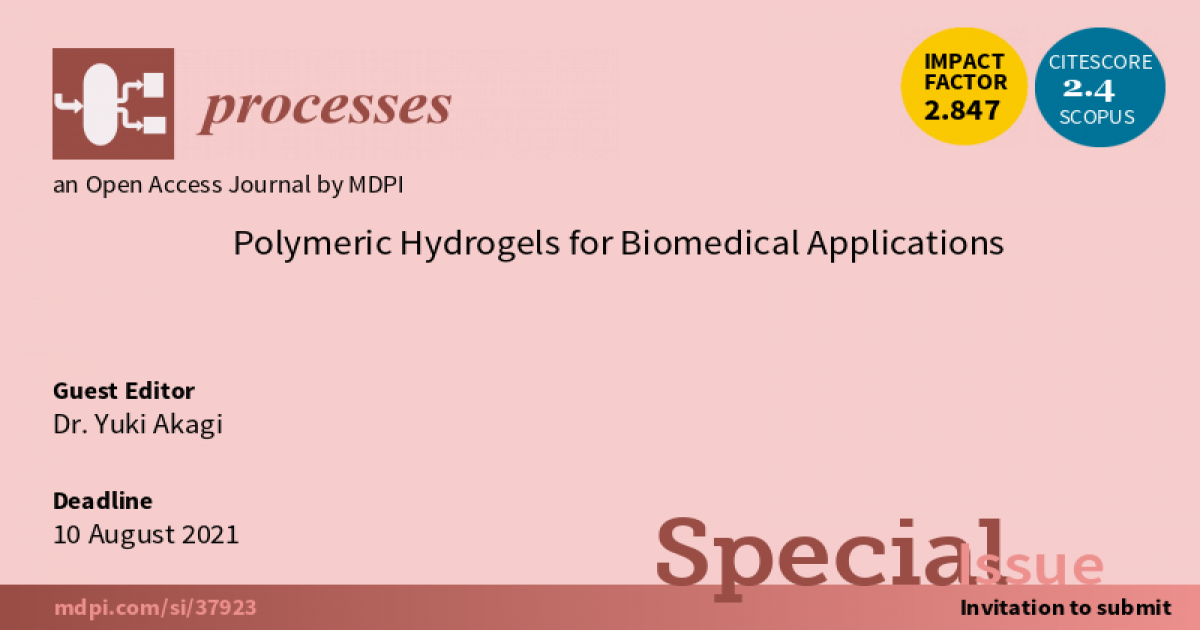Polymeric Hydrogels for Biomedical Applications
A special issue of Processes (ISSN 2227-9717). This special issue belongs to the section "Materials Processes".
Deadline for manuscript submissions: closed (10 August 2021) | Viewed by 2609

Special Issue Editor
Interests: biomaterials; polymer science; hydrogels; stimulus responsiveness; drug delivery system
Special Issues, Collections and Topics in MDPI journals
Special Issue Information
Dear Colleagues,
Hydrogels, due to their high water content and structure close to living organisms, are used as versatile biomedical materials in industries and research. Recently, research on functionalization of the polymers and frameworks of hydrogels, as well as separation and material transportation utilizing their network structure, has been highlighted.
The objective of this Special Issue is to deepen our knowledge on hydrogels aimed at biomedical application from a broader perspective. From the design and synthesis of the structure polymers to the proposition, development, and elucidation of processes involved in a variety of phenomena that appertain hydrogels, such as gelation, functionalization, drug release, and separation, we extend our scope with the aim to introduce new knowledge on hydrogel to accelerate its application as well as to seek unprecedented potentials of hydrogels as a biomedical material.
Dr. Yuki Akagi
Guest Editor
Manuscript Submission Information
Manuscripts should be submitted online at www.mdpi.com by registering and logging in to this website. Once you are registered, click here to go to the submission form. Manuscripts can be submitted until the deadline. All submissions that pass pre-check are peer-reviewed. Accepted papers will be published continuously in the journal (as soon as accepted) and will be listed together on the special issue website. Research articles, review articles as well as short communications are invited. For planned papers, a title and short abstract (about 250 words) can be sent to the Editorial Office for assessment.
Submitted manuscripts should not have been published previously, nor be under consideration for publication elsewhere (except conference proceedings papers). All manuscripts are thoroughly refereed through a single-blind peer-review process. A guide for authors and other relevant information for submission of manuscripts is available on the Instructions for Authors page. Processes is an international peer-reviewed open access semimonthly journal published by MDPI.
Please visit the Instructions for Authors page before submitting a manuscript. The Article Processing Charge (APC) for publication in this open access journal is 2400 CHF (Swiss Francs). Submitted papers should be well formatted and use good English. Authors may use MDPI's English editing service prior to publication or during author revisions.
Benefits of Publishing in a Special Issue
- Ease of navigation: Grouping papers by topic helps scholars navigate broad scope journals more efficiently.
- Greater discoverability: Special Issues support the reach and impact of scientific research. Articles in Special Issues are more discoverable and cited more frequently.
- Expansion of research network: Special Issues facilitate connections among authors, fostering scientific collaborations.
- External promotion: Articles in Special Issues are often promoted through the journal's social media, increasing their visibility.
- Reprint: MDPI Books provides the opportunity to republish successful Special Issues in book format, both online and in print.
Further information on MDPI's Special Issue policies can be found here.





